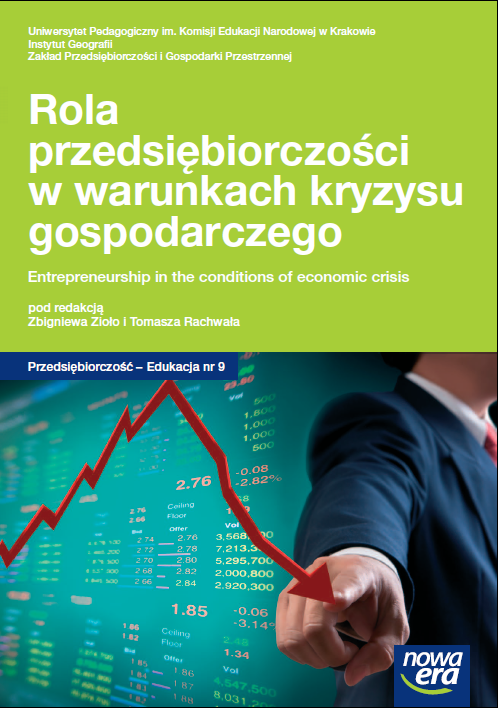Edukacja na rzecz przedsiębiorczości wobec współczesnych wyzwań cywilizacyjno-gospodarczych
DOI:
https://doi.org/10.24917/20833296.9.16Słowa kluczowe:
przedsiębiorczość, edukacja, edukacja ekonomiczna, postawy przedsiębiorczeAbstrakt
Celem artykułu jest prezentacja edukacji na rzecz przedsiębiorczości w szerszym kontekście współczesnych wyzwań cywilizacyjnych i gospodarczych, zwłaszcza w aspekcie trwającego światowego kryzysu gospodarczego, identyfikacja tych wtzwań oraz próba nakreślenia pożądanych kierunków ewolucji edukacji dla przedsiębiorczości. W artykule omówiono problem nauczania przedsiębiorczości, dokonując rozróżnienia pomiędzy nauczaniem przedsiębiorczości ekonomicznej a nauczaniem przedsiębiorczości pozaekonomicznej, ponadto poruszono w nim kwestię wertykalnej oraz horyzontalnej edukacji na rzecz przedsiębiorczości. Artykuł zakończono próbą ustalenia rekomendacji dla dalszego kształtowania edukacji na rzecz przedsiębiorczości.
Bibliografia
Berger, S., Canning, R., Dolan, M., Kurek, S., Pilz, M., Rachwał, T. (2012). Curriculum-Making in Pre- Vocational Education in the Lower Secondary School: A Regional Comparative Analysis within Europe, Journal of Curriculum Studies, 44, 5, 679-701.
Consortium for Entrepreneurship Education, (2008). Entrepreneurship Everywhere: The Case for Entrepreneurship Education, Columbus, OH.
Davidsson, P. (2003). The Domain of Entrepreneurship Research: Some Suggestions, In: Advances in Entrepreneurship, Firm Emergence and Growth, vol. 6, eds. J. Katz, D. Shepherd, JAI Press, Greenwich, CT, 315-372.
Davidsson, P. (2008). The Entrepreneurship Research Challenge, Edward Elgar Publishing Ltd., Chetenham – Northampton, MA.
Drucker, P.F. (1985). Innovation and Entrepreneurship. Practice and Principles, HarperCollins Publishers, New York, NY.
European Commission, (2005). Proposal for a Recommendation of the European Parliament and of the Council on key competences for lifelong learning, COM(2005)548 final, Brussels, 10.11.2005.
European Commission, (2006). Communication from the Commission to the Council, the European Parliament, the European Economic and Social Committee and the Committee of the Regions, Implementing the Community Lisbon Programme: Fostering entrepreneurial mindsets through education and learning, COM(2006) 33 final, Brussels, 13.2.2006.
European Commission, (2008). Entrepreneurship in higher education, especially with non-business studies, Final report of the Expert Group, European Commission – Enterprise and Industry Directorate- General, Brussels – March 2008.
Fayolle, A. (2006). Essay on the Nature of Entrepreneurship Education, In: Understanding the Regulatory Climate for Entrepreneurship and SME., eds. U. Fueglistaller, T. Volery, W. Weber, KMU Verlag HSG, St.Gallen.
Gaweł, A. (2007). Ekonomiczne determinanty przedsiębiorczości, Poznań: Wyd. Akademii Ekonomicznej w Poznaniu.
Garavan, T.N., O’Cinneide, B. (1994). Entrepreneurship Education and Training Programmes: A Review and Evaluation, Journal of European Industrial Training, 18, 8, 3-12.
Gibb, A.A. (1993). The Enterprise Culture and Education. Understanding Enterprise Education and Its Links with Small Business, Entrepreneurship and Wider Educational Goals, International Small Business Journal, 11, 3, 11-37.
Gibcus, P. i in. (2012). Effects and Impact of Entrepreneurship Programmes in Higher Education, European Commission – Enterprise and Industry Directorate-General, Brussels.
Gorman, G., Hanlon, D., King, W. (1997). Some Research Perspectives on Entrepreneurship Education, Enterprise Education, and Education for Small Business Management: A Ten-Year Literature Review, International Small Business Journal, 15, 3, 56-77.
Guzmán, J., Liñán, F. (2005). Perspectives on Entreprenerial Education: A US-Euope Comparison, Universidad Antionio de Nebrija, Madrid.
Hatak, I. (2011). Innovation in Entrepreneurship Education in Europe. An Analysis of New Initiatives, Implementation Processes and Associated Success Factors, Vienna University of Economics and Business – Research Institute for Co-Operation and Co- Operatives, RiCC Research Reports, 3.
Heinonen, J., Poikkijoki, S.-A. (2006). An Entrepreneurial-Directed Approach to Entrepreneurship Education: Mission Impossible?, Journal of Management Development, 25, 1, 80-94.
Henry, C., Hill, F., Leitch, C. (2005). Entrepreneurship Education and Training: Can Entrepreneurship be Taught? Part I, Education + Training, 47, 2, 98-111.
HETAC [cop], Draft Guidelines and Key Criteria for the Review of Enterprise and Entrepreneurship Education (EEC), Higher Education and Training Awards Council.
Jamieson, I. (1984). Schools and Enterprise. W: Education for Enterprise, eds. A.G. Watts, P. Moran, Careers Research and Advisory Centre CRAC, Cambridge, 19-27.
Kirzner, I. (1973). Competition and Entrepreneurship, University of Chicago Press, Chicago, IL.
Kozlinska, I. (2011). Contemporary Approaches to Entrepreneurship Education, Journal of Business Management, 4, 205-220.
Kuratko, D.F. (2005). The Emergence of Entrepreneurship Education: Development, Trends, and Challenges, Entrepreneurship Theory and Practice, 29, 5, 577-598.
Kuratko, D.F. (2009). Entrepreneurship. Theory, Process, Practice, 8th edition, South-Western Cengage Learning, Masson, OH.
Kurek, S., Rachwał, T. (2009). The Role of Business Education in the Development of Entrepreneurship in the Member States of the European Union, Europa XXI, 19, 127-142.
Landström, H. (2010). Pioneers in Entrepreneurship and Small Business Research, New York, NY: Springer.
Marques, L.A., Albuquerque, C. (2012). Entrepreneurship Education and the Development ogf Young People Life Competences and Skills, Journal of Entrepreneurship Perspectives, 1, 2, 55-68.
Najda-Janoszka, M., Wach, K. (2008). Lifelong Learning in the Fields of Tourism in the European Union taking Poland into Special Consideration. W: Entrepreneurship in Tourism and Sport Business, M. Bednarczyk (red.), Kraków: Fundacja dla Uniwersytetu Jagiellońskiego, 45-58.
QAA, (2012). Enterprise and Entrepreneurship Education. Guidance for UK Higher Education Providers, Draft for Consultations, The Quality Assurance Agency for Higher Education, February 2012, mimeo.
Rachwał, T. (2006). Kształtowanie postaw przedsiębiorczych w edukacji szkolnej. W: B. Muchacka (red.), Szkoła w nauce i praktyce edukacyjnej, t. II, Kraków: Oficyna Wydawnicza „Impuls”, 427– 434.
Raposo, M., do Paço A. (2011). Entrepreneurship Education: Relationship between Education and Entrepreneurial Activity, Psicothema, 23, 3, 453-457.
Volkmann, Ch. i in. (2009). Educating the Next Wave of Entrepreneurs. Unlocking Entrepreneurial Capabilities to Meet the Global Challenges of the 21st Century. A Report of the Global Education Initiative, Geneva: World Economic Forum.
Wach, K. (2007). Kształtowanie postaw przedsiębiorczych w programach nauczania. Stan obecny i proponowane kierunki zmian. W: P. Wachowiak, M. Dąbrowski, B. Majewski (red.), Kształtowanie postaw przedsiębiorczych a edukacja ekonomiczna, Warszawa: Fundacja Promocji i Akredytacji Kierunków Ekonomicznych, 120-127.
Wach, K. (2008). Entrepreneurship Education in Poland, ERENET Profile, III, 3 (11), 36-44.
Wach, K. (2012). Europeizacja małych i średnich przedsiębiorstw. Rozwój przez umiędzynarodowienie, Warszawa: Wydawnictwo Naukowe PWN.
Wai Mui Yu Ch., Wing Yan Man Th., (2007). The Sustainability of Enterprise Education: A Case Study in Hong Kong. Education + Training, 49, 2, 138-152.
Wawrzyniak, B. (1988). Przedsiębiorczość – legitymacja do przyszłości, Przegląd Organizacji, 7 (582), 6-9.
Pobrania
Opublikowane
Jak cytować
Numer
Dział
Licencja
Artykuły publikowane są zgodnie z warunkami licencji Creative Commons (CC BY-ND 4.0; uznanie autorstwa-bez utworów zależnych).

